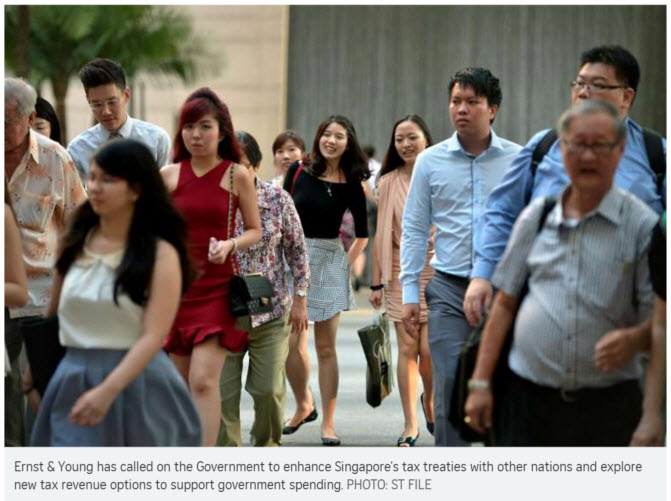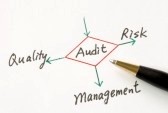SG Budget 2016 – EY’s Wish List

Photo – Straits Times
EY suggested ways to capture new streams of tax revenue.
- lowering the GST registration threshold to S$500,000 from the current S$1,000,000 per annum threshold
- imposing GST on the digital economy. (Mr Kor Bing Keong, a GST Services partner at Ernst & Young Solutions)
On the relief to business, EY has suggested providing incentives for:-
- Singapore-based family offices,
- maintaining the corporate tax rate and;
- increasing the cap of 1% (on employees’ total remuneration) for tax deduction for medical expenses.
TMC Life buying JB’s Thomson Medical Hub for RM400m
So says the headline on Saturday’s Business Times
Buyer – TMC Life – a listco in KL Bourse
Seller – Best Blend – 70% owned by Mr Peter Lim and 30% by Johor crown prince Tunku Ismail Idris Ibni Sultan Ibrahim.
Consideration – RM$400m in 533.3 million new TMC shares at RM0.75 each, together with 266.7 million free warrants.
Story or “Spin” – This deal is in line with TMC’s plan to expand beyond the Klang Valley and will transform it into a major healthcare player in Malaysia.
Strategy – First develop an asset outside the listco. Upon maturity, “sell” the asset to the listco. The majority shareholders would be able to extend its majority stake in listco. The minority shareholder of the selling entity would be able to encash out. The minority shareholders of the buying entity would be in the least enviable position but they are being “compensated” by some “free” warrants
Are std setters and accounting firms behaving like car companies?
“Aren’t standard setters and big accounting firms behaving just like the different car companies?” a someone said to me. “Why?” I asked.
“Every other year, these entities try their very best to push new reporting needs down our throats. Many years ago, the fashion then was to push for Triple Bottom Line reporting where we placed emphasis on companies to report their social and environmental impacts.
A few years ago, the lingo in fashion was corporate governance leading to the Code being adopted as guidelines and thus increased the number of pages in the annual financial reports.
A few years ago, the public listed companies were pushed towards quarterly reporting. Recently, UK has the courage to decide to backtrack on this. The rest of the world awaits the outcome.
The latest model for 2013/2014 is Integrated Reporting.
Key questions – who are we producing all these reports for and is anybody reading them?”
Hmm… something to think about over lunch.
Auditors get into trouble over these issues
 |
| do the plumbers get complaints for doing this? |
Just read this article from ACRA on “Discussion of Past Disciplinary Cases against Public Accountants and Public Accounting Entities”. It is to raise awareness of important issues concerning appropriate and acceptable professional conduct; and to make known actions taken by ACRA to uphold professional conduct. I will focus on the former.
What are most of the complaints against the public accountants about?
Usually they relate to allegations of improper or dishonourable conduct. Of course, this would includes (among others) a failure to comply with the Code of Professional Conduct and Ethics for Public Accountants and Accounting Entities (the Code).
Examples of main areas of complaints are:-
1. Can the Auditor retain or exercise a lien over the documents till fees (or ransom?) are paid? Similarly, can the Auditor refuse the request from client to release audited financial statements before settlement of fees?
The sad thing is the law or code of conduct does not offer much direction as it takes the position that “Generally, it is a private matter between him and his client”.
Confusion would reign in the form of determining auditor’s responsibility to client who may suffer financial and/or reputational loss when the client fails to fulfill statutory filing or meeting commercial obligations without the documents or the audited financial statements.
2. Poaching clients of another public accountant who referred work to the public accountant.
Public Accountant A outsourced part of his work from Client to Public Accountant B. Client fell in love with Public Accountant B and asked B to take the job from A all together. What should Public Accountant B do? To me this is pretty obvious. My own guiding principle in the conduct of my business when in B’s predicament would be for B to seek permission from A. If A says no, B should walk away. As I do intend to be in the business for long term, protecting my professionalism is of paramount importance on this little red dot of Singapore.
3. Fees disputes.
A pretty common issue that needs to be specifically addressed upfront in the appointment discussion and documentation.
4. Independent issues
I quote – “A public accountant should avoid situations which would give rise to the impression that his integrity and objectivity might be compromised or impaired when he was performing the role as the auditor.”
Example cited in the paper – Can a member of an audit team be performing an audit of a company in which a related party is working as a director or a senior position?
My own guiding principle is again simple – When you yourself can have a doubt over a matter that may challenge your independence, please declare to all parties concerned and let the parties concerned decide on your participation or walk away from the situation.
5. Conduct during practice review
ACRA may on many occassions conduct practice review of its public accountants. It is the duty of the public accountants concerned to render the necessary assistance and provide the necessary documents to appointed reviewers. Instead the reviewers receives shouting, foul language, threats and harassment from similarly “harassed and distressed” public accountants, defending their livelihood.
Yes, we should maintain basic civility between fellow human beings, each trying to do their job.
Good day and smile.
Unusual treatment for UnUsUal Entertainment
 |
| multi million dollars from entertaining you |
What is the law?
GST-registered businesses must charge GST output tax on the sale of their goods and services at the prevailing GST rate and account accurately to IRAS.
What happened?
IRAS found out that UnUsUal Entertainment (“UnUsUal”) had wrongly declared or “under declared” its output tax for 2005 and 2006. UnUsUal had not included the GST collected on tickets sales for both years as output tax in its GST returns.
How did IRAS find out?
This is the interesting part. IRAS found that sales figures submitted by UnUsUal for income tax purposes did not tally with the sales figures reported for output tax for 2005 and 2006. For example, the sales revenue declared for 2005 income tax was $9,136,361.00, against the $2,810,668.00 declared as total sales in their GST returns in the same year.
The conviction demonstrates the effectiveness of inter-departmental sharing of information.
What is the side issue?
The GST submission and income tax computation was done by its tax agent. The case also reminded us that it was clearly stated that the responsibility of accounting for GST on ticket sales lies with taxpayer. However, UnUsUal failed to check the GST returns prepared by its tax agent, which resulted in incorrect tax returns.
What is the penalty?
UnUsUal was found guilty of wrongly stating the output tax in its Goods and Services Tax (GST) returns, resulting in an underpayment of $502,922.27 in GST. UEPL was ordered to pay a penalty of $601,632.72 and a fine of $10,000.
UEPL pleaded guilty to four charges of under-declaration of GST without reasonable excuse. Four remaining charges were taken into consideration for sentencing.
Auditing – Crumbling Art Form?
 |
| Audit conundrum? |
What is the event that triggers the doomsday scenario for auditing profession?
The US housing crisis before 2009. It sparked off a series of bank collapses or near collapses leading to forced government bailouts for some banks and loss of billions of dollars for many depositors, investors and homeless homeowners.
In October 2010, the European Commission issued “Green Paper Audit Policy – Lessons from the Crisis” to open a debate on two key matters:-
- the expectation gap between auditors and the users of financial statements; and
- the issue of independence, size and governance of audit firms.
Singapore contributed to the debate through a series of panel discussions organised by ICPAS, ICAEW and SID.
Here are some key comments and observations of the debates and my humble responses to the respective comment:-
1. “Many of the speakers cast audit and auditors as a misunderstood lot – it is just unfortunate that investors and users of financial statements do not fully appreciate the value and the limitations of an audit.” – Willie Cheng.
Edgar – Audit profession is said to have responded by attempting to EDUCATE the “misinformed” public about what an audit is and what is not. So far in my “baseless” opinion, the “misinformed” public (who are both, your clients and users) has yet to be fully informed/convinced and consequently be fully appreciative of auditor’s work. Why?
I guess the “misinformed” public have read and some have been personally hurt when business entities that have been subjected to the vigorous regime of audit procedures, have actually gone bankrupt or going bankrupt, succumbed to frauds etc etc.
In most of these debacles, the auditors have been seen to have been able to walk away from the rubbles unscathed on defences that “an audit is FIRSTLY to just express an opinion on the true and fair view of the financial statement and SECONDLY, not to report on the financial health of the company”. Auditors want to be paid for their services but to the “misinformed” public, they do not seem to carry appropriate level of responsibilities and liabilities.
Let me cite a situation from Jonathan Weil’s article entitled “Why have auditors at all?”, which is unfolding before our very eyes. PwC said MF Global and its units “maintained, in ALL Material respects, effective internal control over financial reporting as of March 31, 2011”. MF Global filed for bankruptcy about 6 months later on Oct 31, 2011 with USD1.2 billion of customer’s money MISSING!!!. A lot of people who have relied on that audit opinion lost a lot of money.
2. Willie Cheng opined that the key root of auditor/”misinformed” public expectation gap lies in the issue of auditor independence.
What is the problem?
As the “person writing the cheque calls the shots” or “He who pays the piper calls the tune”, it is very difficult for the auditors to stand up against the Board of Directors/managements to preserve shareholders’ and stakeholders’ interests when your rice bowls are at stake.
Counter measures that have been encouraged over the last few years are:-
- ensure auditor rotation
- limits on fees from non-audit services and;
- increasing the role and powers of the audit committees.
Edgar – Are these measures sufficient?
In my “baseless” humble opinion, no. Two further key areas are being addressed. Firstly, we need to tackle the bunch of people who are writing the cheques to the auditors. Secondly, the European Commission want to address the structure of providers of audit services.
What do I mean by the “bunch of people who are writing the cheques to the auditors”? I am referring to the individuals who are appointed directors/senior managers of business entities. Essentially all the current debates on corporate governance, term of directorship, number of directorships, independence/executive/non-executive status focus on strengthening the quality and ethical compass of our limited pool of directors in this small ecosystem of directors and auditors in Singapore.
European Commission is also encouraging an open debate on reforming the audit providers industry. Please consider the possibility of KPMG, Deloitte, Ernst & Young and PwC being required to put their audit and other consultancy services in separate legal entities with “unrelated” branding.
Or perhaps increase the number of “authorised” and “acceptable” audit providers for public-listed entities. The “misinformed” public, like me, seems to have the impression that the Big 4 are auditors of most public listed companies in Singapore. Take for example – When a PLC, currently being audited by Ernst &Young, got into some sort of trouble, one of the other 3 firms would be appointed to conduct the SPECIAL audit. There isn’t many alternatives.
Concluding remark – Questions like “Do we need auditors?”, “Why have auditors at all?”, “What are the roles and responsibilities of auditors?” will continue to be raised with answers leading to the destruction of existing structures and birth of a better structure (I hope) as part of a necessary evil of natural human thirst to do things better.
References
Willie Cheng, “Change is in the air for auditors”, Business Times, Sep 22, 2011.
Jonathan Weil, “Why have auditors at all”, Straits Times, Nov 28, 2011.
Acknowledge credit on graphic used
http://www.123rf.com/stock-photo/audit.html
Can bankrupts hold directorships?
Apparently yes as almost anyone can sign up to be directors of companies.
There is no independent check by ACRA. At least this is the situation when Justice Steven Chong, a High Court judged criticised ACRA in a case reported in Straits Times, Dec 9, 2010 page B10.
It is thus apparent that there is no database linkage between ACRA and IPTO (Insolvency and Public Trustee’s Office.
The implication is that an undischarged bankrupt may continue to operate companies for years.
Not sure whether the gap between ACRA and IPTO has since been rectified. Anyone any info on this front?
In similar vein, should there a database linkage between ACRA, IRAS, CPF, Ministry of Manpower and Immigration and Checkpoints Authority?
Cloud computing costs are now PIC-able
On Deepavali Day, I received a very pleasant surprise.
I just read that Cloud Computing Costs are not only tax-deductible (which we know) as business expenses, they now qualify for additional deduction under Productivity & Innovation Credit.
An example cited in ST’s news article – “word processing that exist online rather than on individual computers”. A $100 expense would qualify for up to $400 deduction against your income (subject to meeting other terms and conditions.)
 |
| Christmas present? |
Important terms and conditions to note before we jump for joy are:-
1. spent on qualifying expenditure and are entitled to PIC during the time period concerned
2. active business operations in Singapore
3. at least 3 local employees at the VERY last month of the qualifying time period
(Who are the 3 employees? INCLUDING Singaporeans & PRs but EXCLUDING sole proprietors, partners under contract for service and shareholders who are directors of company)
Monetary Authority of Singapore (MAS) posted a record net loss of $10.9 billion for the year ended March 31, 2011
I am naturally curious to read on for the cause of the massive loss and that being the 2nd loss in the last 40 years. Here are the info that I reaped STRICTLY from the articles from Business Times and Straits Times on Friday last.
Numbers as published:-
- Total loss – $10.9 billions
- Investment gains before adjusting for exchange rate revaluation – $12.3 billions.
- SGD up against USD by 10% for year ended March 31, 2011.
- SGD up against Euro by 5%.
- Given the stronger SGD, domestic oil prices up by only 10% as compared to 20% on a global basis.
- MAS manages $299.8 billions in assets as at year ended March 31, 2011 with foreign financial assets representing $287.7 billions ie. 96%!!!!
Here are the various key points discussed:-
- Headline in BT attributed the massive loss to strong SGD. (Edgar – Thus exchange rate is said to be responsible for $23.2 billions reversal upon valuation of various balance sheet items.)
- ‘With recovery in asset markets over the past two years, MAS’ portfolio, excluding exchange rate effects, has more than recovered from effects of the global financial crisis,’ Mr Menon said. The loss is hence the result of ‘a reporting convention’ as per Mr Menon. If MAS reported its financial results in foreign currencies such as the US dollar or SDRs, as some central banks do, it would reflect a ‘healthy profit’, he noted. (Edgar – I presume he is trying to assure us that the loss is mainly due to a valuation exercise as there is no actual cashflow involved. Are you also telling us that if our reference currency is based on any other weaker currency other than SGD, we would be happy with our performance?)
- But is it not a fact that Singapore’s purchasing power has declined by $10.9 billions? Mr Menon said no as the INTERNATIONAL purchasing power of our reserves is unaffected by the strength of Singapore dollars. I guess he is trying to say the $287 billions worth of foreign currencies would still buy Singapore the same amount of goods and services.
- So what have the stronger SGD and $10.9 billions loss bought for Singapore? MAS has essentially shielded the domestic economy from even higher inflationary pressures as the stronger SGD effectively halved the impact of higher oil and food prices.




